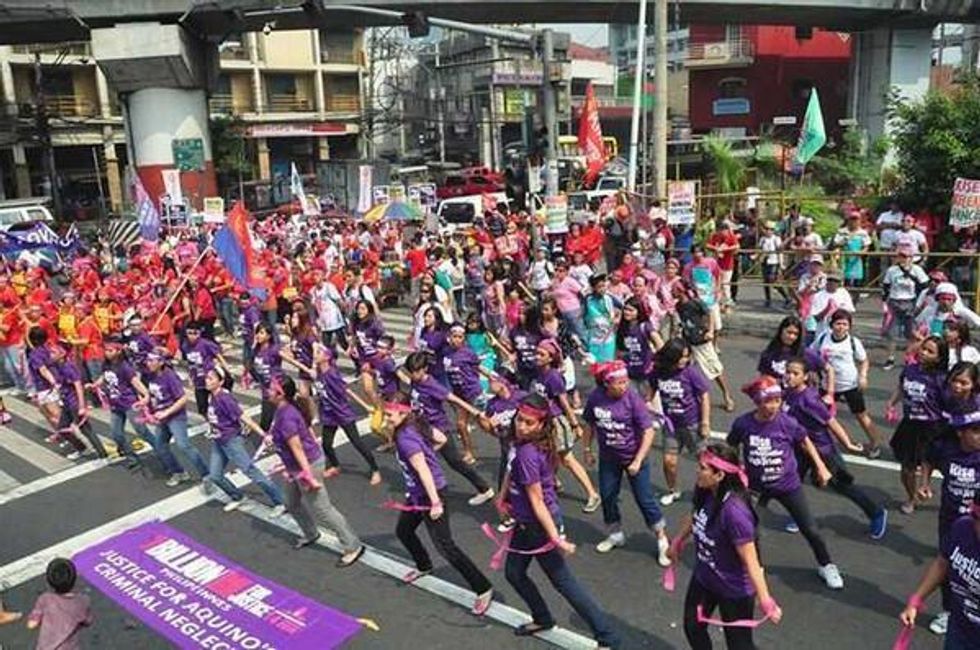'Unsustainable Consumption' by the Rich Is Driving Urban Water Crises: Study
"Due to stark socioeconomic inequalities, urban elites are able to overconsume water while excluding less-privileged populations from basic access," new research shows.
Unequal access to clean water in cities around the globe—an injustice poised to grow worse this century as the fossil fuel-driven climate crisis intensifies droughts—can be attributed in large part to "unsustainable consumption" by high-income residents, according to peer-reviewed research published Monday in Nature Sustainability.
"Over the past two decades, more than 80 metropolitan cities across the world have faced severe water shortages due to droughts and unsustainable water use," the study says. "Future projections are even more alarming, since urban water crises are expected to escalate and most heavily affect those who are socially, economically, and politically disadvantaged."
"Social inequalities across different groups or individuals play a major role in the production and manifestation of such crises," the paper continues. "Specifically, due to stark socioeconomic inequalities, urban elites are able to overconsume water while excluding less-privileged populations from basic access."
Through a case study of the deeply unequal metropolitan area of Cape Town, South Africa, the five authors show how "unsustainable water use by the elite can exacerbate urban water crises at least as much as climate change or population growth."
As the authors stress, "Cape Town's urban form and features are not unique to this city but rather are common to many metropolitan areas across the world. Thus, the model is flexible and can be adjusted to analyze urban water dynamics in other cities characterized by socioeconomic inequalities, uneven patterns of water consumption, and varied access to private water sources and public water supply." Moreover, they add, "this model opens up possibilities for more just and sustainable approaches to managing and distributing water in cities."
Using the Socio-Economic Index created by the Western Cape Province, the scholars sorted Cape Town's population into five classes strewn across "a starkly segregated urban space": elite (1.4% of city inhabitants), upper-middle-income (12.3%), lower-middle-income (24.6%), lower income (40.5%), and the residents of informal settlements on the city's edges (21%).
Elite and upper-middle-income households were combined into the broader category of "privileged groups." These people "usually live in spacious houses with gardens and swimming pools and consume unsustainable levels of water," the paper points out, "while informal dwellers do not have taps or toilets inside their premises."
"The only way to preserve available water resources is by altering privileged lifestyles, limiting water use for amenities, and redistributing income and water resources more equally."
The authors' model of class-based water consumption patterns in Cape Town found that elite and upper-middle-income households respectively consume 2,161 liters and 988 liters per day, on average. Meanwhile, lower-income and informal households respectively consume an estimated average of 178 and 41 liters per day.
"In addition, the results show that most of the water consumed by privileged social groups (elite and upper-middle-income) is used for non-basic water needs (amenities) such as the irrigation of residential gardens, swimming pools, and additional water fixtures, both indoor and outdoor," the paper notes. "Conversely, most of the water consumed by other social groups (lower-middle income, lower income, and informal dwellers) is used to satisfy basic water needs such as drinking water, hygiene practices, and basic livelihood."
Despite constituting just 13.7% of Cape Town's overall population, elite and upper-middle-income households together consume over half (51.4%) of the city's water resources. By contrast, lower-income and informal households represent 61.5% of the city's total population but collectively consume only 27.3% of its water.
As the paper explains: "Privileged groups have access to private water sources in addition to the public water supply. Although we use the term 'private' to identify the additional sources used mostly by privileged social groups, these sources become private only after a process of enclosure and dispossession of common water resources (mostly groundwater) for the sole disposal and benefit of privileged users."
Cape Town's grossly unequal water consumption patterns are "rooted in" capitalist social relations, according to the scholars. "While benefiting a privileged minority, this political-economic system is unsustainable because it reduces the availability of natural resources for the less-advantaged population and causes various forms of environmental degradation."
"Domestic water consumption in unequal urban areas such as Cape Town is likely to become unsustainable as a result of excessive consumption among privileged social groups," the paper warns. "Specifically, privileged water consumption is unsustainable because in the short term, it disproportionally uses the water available for the entire urban population. In the long term, privileged consumption constitutes an environmental threat to the status of local surface- and groundwater sources."
The scholars also simulate how Cape Town's socio-spatially uneven patterns of water consumption changed in response to droughts and ensuing water crises.
According to the paper, "The model's results indicate that water management strategies to cope with droughts can seriously affect the water security of poor households by reducing their access to water."
As the authors explain:
The model reproduces the various droughts that occurred between 2008 and 2019 across the metropolitan area of Cape Town. Besides the 2011 drought, the most significant event occurred between 2015 and 2017 and engendered one of the most extreme urban water crises ever recorded. Towards the end of that meteorological drought, the dams of the Cape Town Water Supply System had reached the alarming level of 12.3% of usable water. In response, the municipality imposed severe water restrictions and other measures to avoid 'Day Zero,' the day in which the entire city would have run out of water. The restrictions included water rationing to [350 liters per household per day, or 50 liters per person per day], increased water tariffs, fines for overconsumption or illicit water uses, withdrawal of the free water allocation for households classified as non-indigent, and other measures to enforce the compliance of such restrictions.
The increasing block tariff, designed to charge incrementally higher rates to heavier consumers and cross-subsidize light users, was only partially successful in meeting the needs of the poorest population. Indeed, low-income users could not afford the revised tariff. Very often, these residents live in overcrowded units where more than eight people share the same tap and end up being charged unaffordable water bills and fines.
Ultimately, the authors observe, "low-income residents are significantly more vulnerable to the demand-management measures enforced by the city than are more-affluent inhabitants, who can afford tariff increases and can access and develop alternative water sources."
"Throughout the drought period of January 2015 to July 2017, the lower-income group had to reduce their already limited daily consumption from [197 liters per household per day to 101 liters per household per day], a reduction of 51%," the study notes. "These results indicate that drought-related restrictions can leave lower-income households without enough water to meet their basic water demands for bathing, laundry, cooking, and sustaining their livelihoods. Conversely, the consumption trends of the elite and upper-middle-income groups show that these households have sufficient water for their basic needs even during drought restrictions."
"Current policies aimed at tackling drought and urban water crises focus mostly on building resilient cities through additional as well as more-efficient water infrastructure and technologies, alongside progressive water pricing," the study points out. "Yet such techno-managerial solutions are insufficient to address future water crises because they overlook some of the root causes."
"Urban water crises can be triggered by the unsustainable consumption patterns of privileged social groups," the authors emphasize. "These patterns are generated by distinctive political-economic systems that seek capital accumulation and perpetual growth to the exclusive benefit of a privileged minority."
"The only way to preserve available water resources," they conclude, "is by altering privileged lifestyles, limiting water use for amenities, and redistributing income and water resources more equally."



